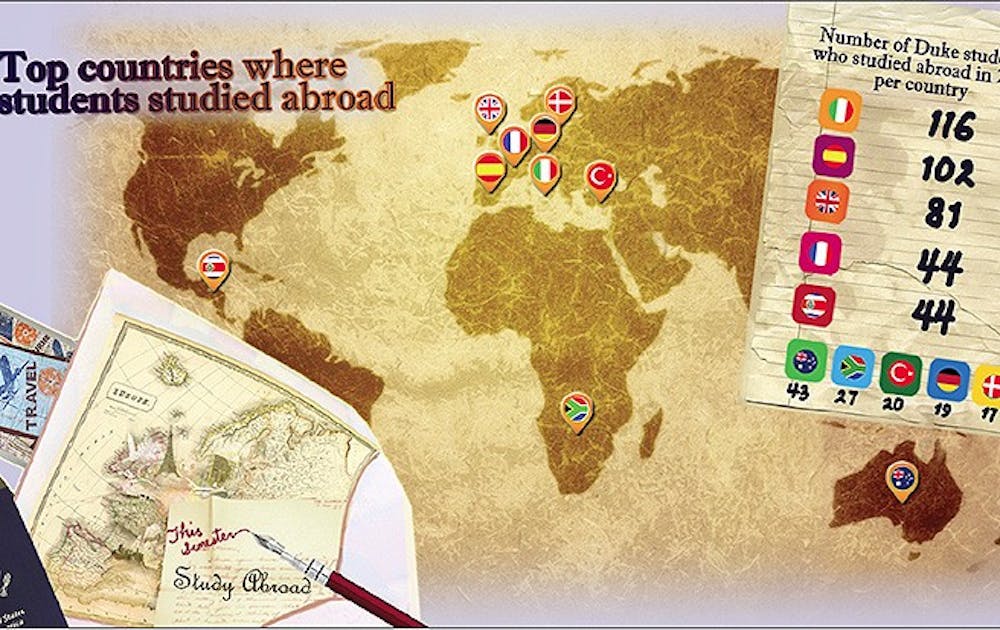Despite increasing talk about a broader global focus, the numbers show European countries remain the primary destination for Duke students studying abroad.
Of a total 576 students who studied abroad in Fall 2012, 412 studied in Europe, according to data from the Global Education Office for Undergraduates. Italy, Spain and the United Kingdom are the three most popular locations, and only three non-European countries—Australia, Costa Rica and South Africa—rank in the top 10. The breakdown has stirred conversation about the different levels of cultural and language immersion available to students depending on the region of the world.
Duke currently sponsors 14 semester programs—nine are located in Europe, three in Asia, one in Africa and one in Latin America. The Global Semester Abroad program located for the first half of the semester in Udaipur, India and the second half in Beijing, China, is currently in its last year.
“Historically, Western Europe has always been favored as a destination, not just by Duke students, but nationally,” Director of Global Education Margaret Riley said in an e-mail Tuesday.
The Institute of International Education reported that the top three study abroad destinations for 2012 were the United Kingdom, Italy and Spain. The report noted that countries outside Europe saw significant gains in popularity, with the number of students studying in China and India growing by 5 percent and 12 percent respectively.
Some suggest programs set in Europe are less culturally immersive for United States students due to cultural similarities. Others say these programs are still valuable.
“Obviously, the pros and cons have entirely to do with what students’ interests are,” said Ralph Litzinger, co-director of the GSA program and professor of cultural anthropology.
Litzinger said, as one strength, European countries offer a chance to learn more about Europe, the European Union and historically ‘Western’ places, but students may be less exposed to more unique conditions in other areas of the world.
“[Students who study abroad in Europe] would take exception to any suggestion that a semester in France is less culturally immersive or eye-opening than a non-Western nation,” Riley said. “Obviously there are cultural differences that can be experienced regardless of destination, even within the United States.”
Richard Rosa, associate professor of Spanish and director of Duke in Madrid, added that though Spain and other parts of Europe may have more in common with the United States than other regions of the world, there are still important cultural differences.
“Europe is changing a lot in terms of immigration in the last few decades, so when we think about Europe, we should not be thinking about this image of a traditional Europe, but also of a place that is changing a lot and undergoing some important demographic transformations,” Rosa said.
Even in Europe-based programs, the notion of study abroad is changing from the idea of the “gentlemanly tour” for wealthy, white students to a more involved, immersive experience compatible with the addition of new programs in non-traditional countries and a shift to adapting to globalization, Rosa said.
“Students want to get more involved in the everyday things going on in the places they are visiting and being participants in social activities, for example,” Rosa said. “When you go to those [Europe-based] programs, I think you will find a different kind of Europe in each of those countries.”
Although Global Education programs are not necessarily diverse in terms of physical location, Riley said there are different ways to define diversity. For example, she cited four domestic semester and two domestic summer options. Although they are termed ‘study away’ not study abroad, the specific themes of these programs create unique educational experiences with out-of-classroom components.
323 Duke students chose to participate in programs run through other institutions compared to 148 Duke students who chose Duke-sponsored programs, which offer courses that automatically count toward a student’s GPA and graduation requirements.
Sophomore Jaclyn Dobies is currently in the process of getting a School for International Training in Cameroon titled Social Pluralism and Development program approved for credit. Dobies, an international comparative studies and French double major looking for a Francophone program in Africa, said she was not able to find something that Duke offered or had already approved that fit her interests.
“What Duke offers is good but limited,” Dobies said. “[Programs] are in hotspots for study abroad like Spain and Friance. I think it’s good Duke allows students to petition for programs because it allows for them to do what they’re really interested in.”
Although Dobies said she is happy with her decision to pursue approval for a non-Duke program, she added that not getting credit towards her Duke GPA or being able to use courses from her program of choice to fulfill Modes of Inquiry requirements are disadvantages and create extra pressure regarding class selection in her remaining semesters.
Riley, who will retire next year, predicted that her eventual successor and a committee currently working on a strategic plan for global education will make further changes to the existing opportunities.
“All students who are going to read this article need to know that the ground is changing underneath their feet,” Litzinger said. “I have had administrators say to me that the University as we know it will not look the same in 10 years, but a lot of people have the sense that things are changing and changing very rapidly. But I don’t know what that Duke will look like in 10 years.”
An earlier version stated that only two non-European countries made the top 10 most popular, when in fact three did. The Chronicle regrets the error.
Get The Chronicle straight to your inbox
Signup for our weekly newsletter. Cancel at any time.

